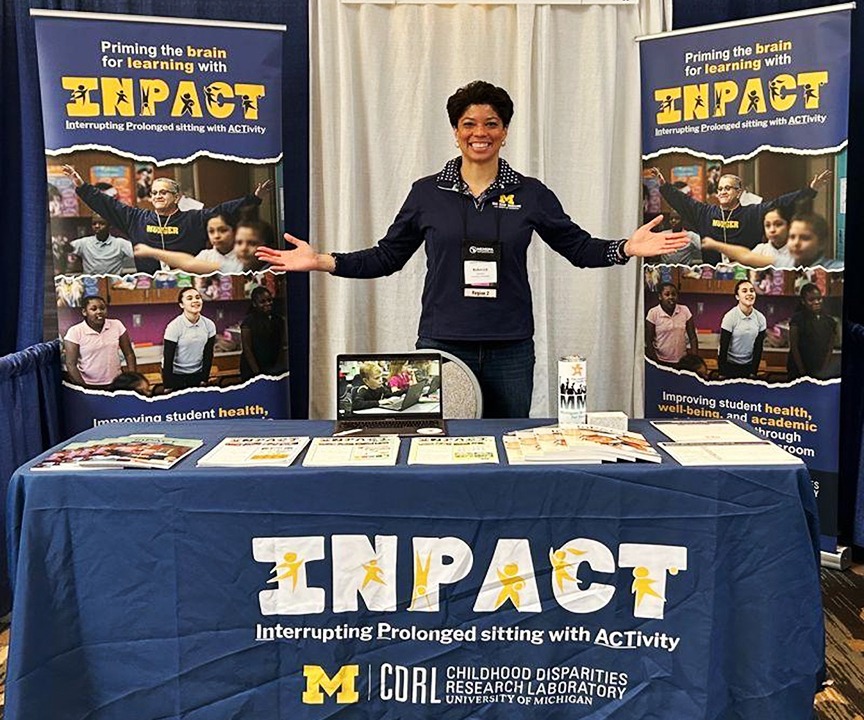This post is also available in: Español (Spanish) Português (Portuguese)
Less than half (42%) of children in the United States meet the recommended 60 minutes of physical activity each day, with even lower rates reported in under-resourced communities. This lack of physical activity puts kids at a higher risk for obesity, anxiety, depression, school absenteeism and lower academic performance.
Children in socioeconomically disadvantaged areas often face barriers to engaging in physical activity. These hurdles can include a perceived lack of safety in their neighborhoods due to high rates of crime and the lack of access to parks and other public greenspaces. Additionally, schools in under-resourced settings are less likely to offer recess, certified physical education teachers and after-school sports programs.
Dr. Rebecca Hasson, a member of the W.K. Kellogg Foundation’s Global Fellows Network, is tackling these challenges by building short physical activity breaks into the school day. Hasson is director of the University of Michigan Childhood Disparities Research Laboratory and created the Interrupting Prolonged Sitting with Activity (InPACT) program, which provides teachers with training, resources and ongoing support to integrate five, four-minute activity breaks into students’ daily routines.
“We’re trying to create a culture of health throughout the entire school day, not just in gym,” says Hasson.
Dr. Hasson participated in the Scholars in Health Disparities Program (2010 to 2012), which provided her with postdoctoral training in the social determinants of health. “This training provided a strong foundation for establishing a research focus on providing equitable access to structured physical activity opportunities both locally and globally,” shared Dr. Hasson.
With a strong commitment to community engagement, Hasson and her team developed InPACT in collaboration with educators, health coordinators and school administrators across Michigan. InPACT includes instructional guides, behavior management strategies, exercise videos and classroom layout recommendations. Research shows that InPACT boosts students’ activity levels, attention spans, enjoyment and academic goal achievement. Plus, Hasson says, “The kids think this is totally cool and fun.”
The InPACT team has expanded the program to under-resourced school districts across the state, tailoring it to their specific needs and addressing organizational and systemic challenges.
During the COVID-19 pandemic, disparities grew in communities with fewer built and social environmental supports for physical activity. To address the limited access to structured physical activity, Hasson introduced the InPACT at Home program. This initiative, adapted from the classroom-based InPACT intervention, involved collaborating with physical education teachers, fitness professionals, pediatric exercise physiologists and professional sports teams. Together, they created age-appropriate exercise videos designed for easy completion at home with minimal or no equipment. The exercise routines included aerobic exercises, isometric strength training, motor skills development, sports skills, yoga and mindfulness training.
In addition to the exercise videos, the program included physical activity play cards and family engagement tool kits. These resources provided another avenue for children and families to engage in movement and play together.
The program continues to have impact beyond the pandemic. Today, the InPACT at Home exercise videos are broadcast on public television through the Michigan Learning Channel. The program stands out as one of the few home-based physical activity interventions utilizing virtual methods to motivate young people to remain active. More recently, Hasson is working with Michigan Medicine to restructure clinical practice to identify children not meeting the recommended 60 minutes of daily physical activity, who will then receive prescriptions for InPACT at Home exercise videos from their primary care physicians.
The resources from InPACT and InPACT at Home have been consolidated into an integration guide for the Michigan Model for Health™, a comprehensive universal health education curriculum implemented in more than 38 states. This integration aims to augment the physical activity and family engagement components in the curriculum.
To learn more, visit the InPACT and InPACT at Home websites.









Comments